

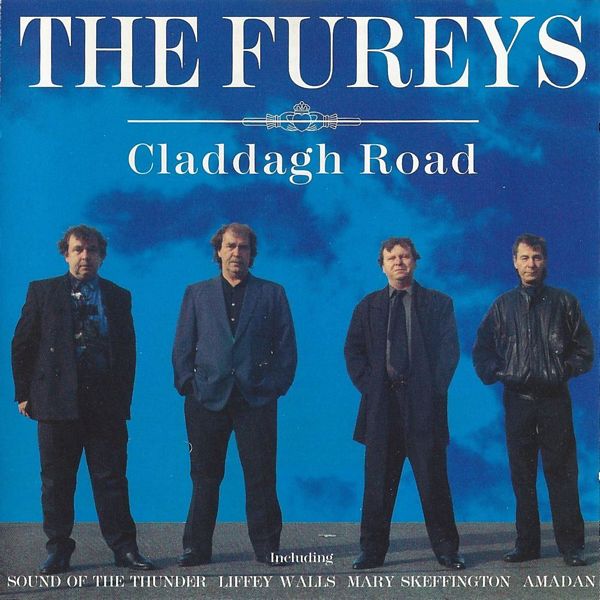 |
 |
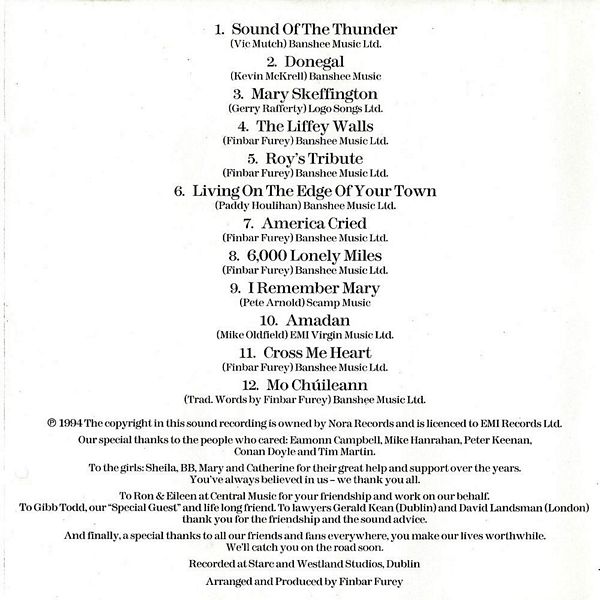
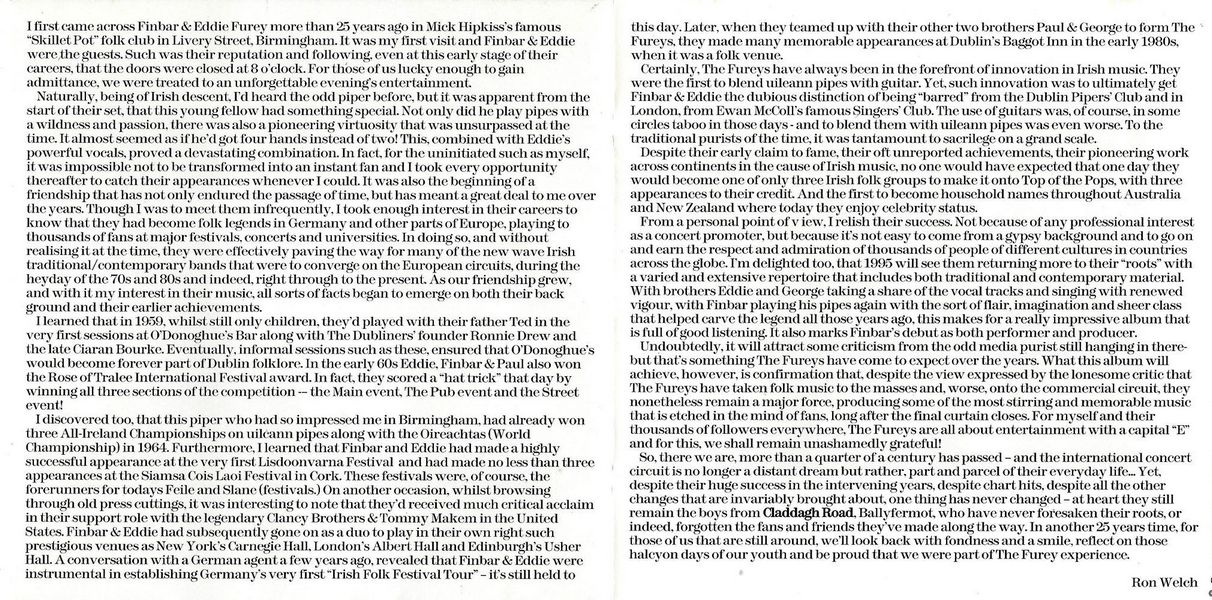 |
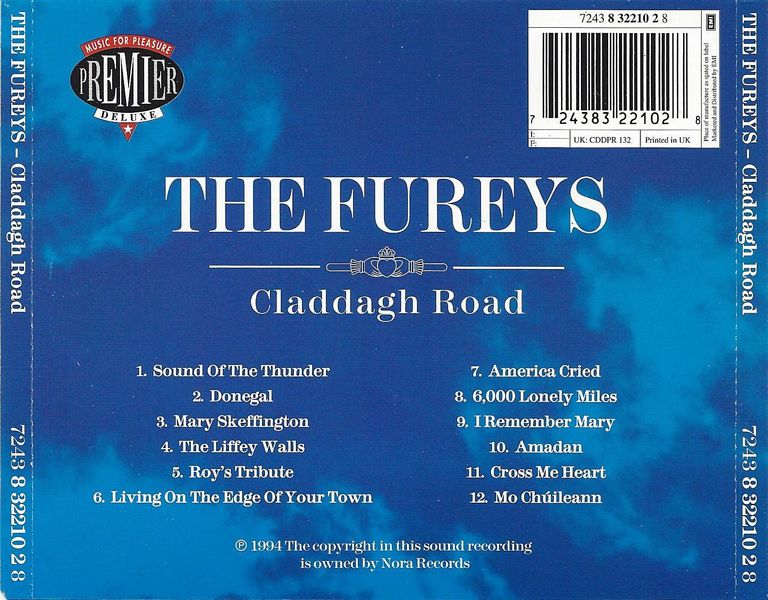
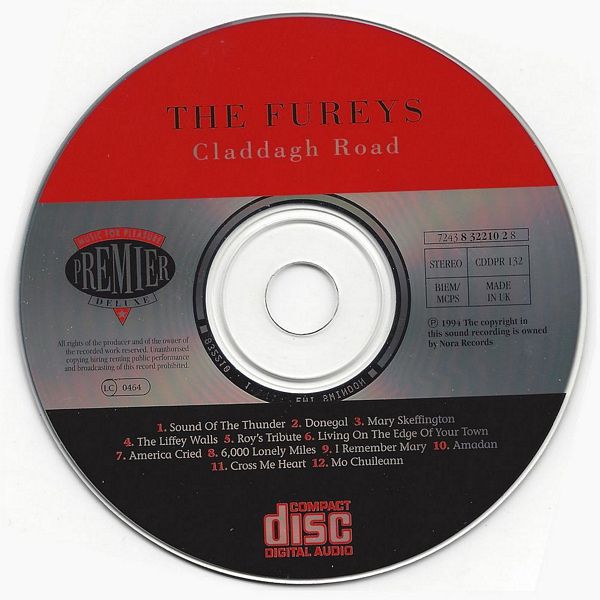 |
Sleeve Notes
I first came across Finbar & Eddie Furey more than 25 years ago in Mick Hipkiss's famous "Skillet Pot" folk club in Livery Street, Birmingham. It was my first visit and Finbar & Eddie were the guests. Such was their reputation and following, even at this early stage of their careers, that the doors were closed at 8 o'clock. For those of us lucky enough to gain admittance, we were treated to an unforgettable evening's entertainment.
Naturally, being of Irish descent I'd heard the odd piper before, but it was apparent from the start of their set, that this young fellow had something special. Not only did he play pipes with a wildness and passion, there was also a pioneering virtuosity that was unsurpassed at the time. It almost seemed as if he'd got four hands instead of two! This, combined with Eddie's powerful vocals, proved a devastating combination. In fact, for the uninitiated such as myself, it was impossible not to be transformed into an instant fan and I took every opportunity thereafter to catch their appearances whenever I could. It was also the beginning of a friendship that has not only endured the passage of tune, but has meant a great deal to me over the years. Though I was to meet them infrequently, I took enough interest in their careers to know that they had become folk legends in Germany and other parts of Europe, playing to thousands of fans at major festivals, concerts and universities. In doing so, and without realising it at the time, they were effectively paving the way for many of the new wave Irish traditional/contemporary bands that were to converge on the European circuits, during the heyday of the 70s and 80s and indeed, right through to the present As our friendship grew, and with it my interest in their music, all sorts of facts began to emerge on both their back ground and their earlier achievements.
I learned that in 1959, whilst still only children, they'd played with their father Ted in the very first sessions at O'Donoghue's Bar along with The Dubliners' founder Ronnie Drew and the late Ciaran Bourke. Eventually, informal sessions such as these, ensured that O'Donoghue's would become forever part of Dublin folklore. In the early 60s Eddie, Finbar & Paul also won the Rose of Tralee International Festival award. In fact, they scored a "hat trick" that day by winning all three sections of the competition — the Main event, The Pub event and the Street event!
I discovered too, that this piper who had so impressed me in Birmingham, had already won three All-Ireland Championships on uilleann pipes along with the Oireachtas (World Championship) in 1964. Furthermore, I learned that Finbar and Eddie had made a highly successful appearance at the very first Lisdoonvarna Festival and had made no less than three appearances at the Siamsa Cois Laoi Festival in Cork. These festivals were, of course, the forerunners for today's Feile and Slane (festivals.) On another occasion, whilst browsing through old press cuttings, it was interesting to note that they'd received much critical acclaim in their support role with the legendary Clancy Brothers & Tommy Makem in the United States. Finbar & Eddie had subsequently gone on as a duo to play in their own right such prestigious venues as New York's Carnegie Hall, London's Albert Hall and Edinburgh's Usher Hall. A conversation with a German agent a few years ago, revealed that Finbar & Eddie were instrumental in establishing Germany's very first "Irish Folk Festival Tour" — it's still held to this day. Later, when they teamed up with their other two brothers Paul & George to form The Fureys, they made many memorable appearances at Dublin's Baggot Inn in the early 1980s, when it was a folk venue.
Certainly, The Fureys have always been in the forefront of innovation in Irish music. They were the first to blend uilleann pipes with guitar. Yet such innovation was to ultimately get Finbar & Eddie the dubious distinction of being "barred" from the Dublin Pipers' Club and in London, from Ewan McColl's famous Singers' Club. The use of guitars was, of course, in some circles taboo in those days — and to blend them with uilleann pipes was even worse. To the traditional purists of the time, it was tantamount to sacrilege on a grand scale.
Despite their early claim to fame, their oft unreported achievements, their pioneering work across continents in the cause of Irish music, no one would have expected that one day they would become one of only three Irish folk groups to make it onto Top of the Pops, with three appearances to their credit And the first to become household names throughout Australia and New Zealand where today they enjoy celebrity status.
From a personal point of view, I relish their success. Not because of any professional interest as a concert promoter, but because it's not easy to come from a gypsy background and to go on and earn the respect and admiration of thousands of people of different cultures in countries across the globe. I'm delighted too, that 1995 will see them returning more to their "roots" with a varied and extensive repertoire that includes both traditional and contemporary material. With brothers Eddie and George taking a share of the vocal tracks and singing with renewed vigour, with Finbar playing his pipes again with the sort of flair, imagination and sheer class that helped carve the legend all those years ago, this makes for a really impressive album that is full of good listening. It also marks Finbar's debut as both performer and producer.
Undoubtedly, it will attract some criticism from the odd media purist still hanging in there — but that's something The Fureys have come to expect over the years. What this album will achieve, however, is confirmation that, despite the view expressed by the lonesome critic that The Fureys have taken folk music to the masses and, worse, onto the commercial circuit, they nonetheless remain a major force, producing some of the most stirring and memorable music that is etched in the mind of fans, long after the final curtain closes. For myself and their thousands of followers everywhere, The Fureys are all about entertainment with a capital "E" and for this, we shall remain unashamedly grateful!
So, there we are, more than a quarter of a century has passed — and the international concert circuit is no longer a distant dream but rather, part and parcel of their everyday life … Yet, despite their huge success in the intervening years, despite chart hits, despite all the other changes that are invariably brought about, one thing has never changed — at heart they still remain the boys from Claddagh Road, Ballyfermot, who have never foresaken their roots, or indeed, forgotten the fans and friends they've made along the way. In another 25 years time, for those of us that are still around, we'll look back with fondness and a smile, reflect on those halcyon days of our youth and be proud that we were part of The Furey experience.
Ron Welch